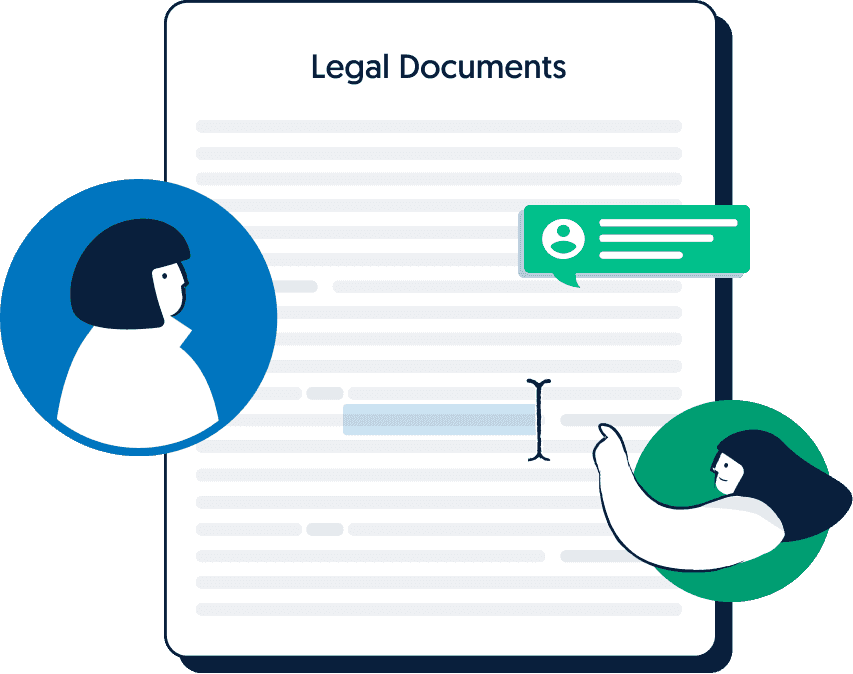Based in Sydney, Raja is a law student enrolled in a Bachelor of Laws and Bachelor of Communications (Writing and Publishing) at the University of Technology Sydney. He is passionate about transferring knowledge in relation to businesses, legal advice and marketing direction. Raja has experience working in immigration law and is driven by the writing, editing and publishing process of content.

Get a free legal document when you sign up to Lawpath
Sign up for one of our legal plans or get started for free today.
Introduction
Legal documents, also called legal instruments, are written records that formalise and prove the existence of an agreement, promise, or legal obligation.
They are powerful tools that are designed to clarify the rights and responsibilities of everyone involved in a transaction or business relationship and help those involved minimise certain risks.
In today’s world, it is almost impossible for businesses to function effectively without legal documents. From defining employee obligations to clarifying dispute resolution mechanisms, these documents are invaluable to improving efficiency in business operations.
As the years go by, business activities become more sophisticated to keep up with consumers’ ever-changing needs. A business’s legal documentation must also evolve to meet these realities.
If you’re starting a business or you already own one, certain legal documents are crucial to staying updated with government regulations, protecting your interests as a business owner, meeting consumers’ needs and ensuring your business succeeds.
Below, we highlight the top legal documents your business may need to thrive in 2024 to help you get started.
Top 7 Legal Documents You Need for Your Business
Website Terms and Conditions
If you run an online business or have a business website, then you must have a well-crafted document that details the website’s terms and conditions.
This document primarily clarifies the crucial aspects of your business or website operations for your (prospective) customers and website users so there’s no confusion about how your business works and what you offer.
As an Australian business owner, your website terms and conditions document must contain certain essential details, including information about
- Payment options
- Cancellation policies and options
- How sales work
- Consumer guarantees
- Return and refund policies.
- The procedure for resolving customer complaints.
Website terms and conditions are legally binding and can be used against you if there’s a dispute with a customer. As such, it is important that you only make claims or promises that you are willing to fulfill within the document.
Your website terms and conditions document should also be written in clear and unambiguous language so everyone understands what the document covers and the scope of your services.
Social Media Policy
Having a strong social media presence can help your business stay connected with customers and respond to their questions quickly.
However, despite the benefits, one mistake or wrong post could harm your brand in fundamental ways. That’s why it is essential that everyone on your team is clear about your brand’s social media strategy and permitted online behaviour. That’s what a social media policy is for.
A social media policy forms part of a business’s in-house regulations, establishing clear guidelines for the employees who represent the brand online. Having one can help to strengthen your brand identity and reduce the risk of inappropriate behaviour, thereby protecting your business from bad publicity and possible legal issues.
Work, Health and Safety Policy
Different states across Australia have work, health, and safety laws and regulations. These laws promote the safety of everyone in a work environment and create specific safety obligations for employers, business owners, and employees depending on the industry.
As a business owner, you are required to implement the appropriate health and safety practices for your industry as soon as you start your business. It is also your responsibility to ensure that your workers comply with the law, which is why you need a defined work, health and safety policy for your business.
This policy document is important to ensure that everyone, including your employees, is aware of their safety obligations, leaving little room for errors.
Having a work, health, and safety policy is also a great way to establish your compliance with the law if it is ever questioned.
Work From Home Policy
Remote working is becoming increasingly popular in the wake of the COVID-19 pandemic. However, because employees are allowed to work from anywhere without supervision, there’s a risk of productivity decline. Clear guidelines are, therefore, important for remote or partly remote (hybrid) work arrangements to be effective.
A work from home policy allows you to clarify your expectations from employees who are working outside the office and how their performance will be measured. This way, it is easy to hold them accountable.
If your business only permits working from home in certain circumstances, such as family emergencies, your policy should clearly state this as well.
Loan Agreement
A loan agreement is a legally binding contract between two parties (the lender and the borrower). The lender agrees to provide a sum of money to the borrower, and the borrower agrees to repay the sum at a specific time and under specific conditions.
As a business owner, a loan agreement is important whenever you engage in any loan transaction, whether as a lender or borrower, for several reasons:
- It formalises your transaction
- It clarifies the terms of the loan agreement so everyone understands their obligations, making compliance easier.
- If there is any dispute about the contract or if the other party defaults, enforcing your rights under the agreement is easier. Since the terms of the contract are clearly expressed, it would be easier for a judge to scrutinise them and determine the rights and obligations of both parties.
A written loan contract is also important to help you keep track of your business’s finances. However, every loan transaction is different. So, unless you prepare the agreement yourself, be sure to consult a lawyer before signing anything to confirm that the written contract represents your original agreement and does not contain any clauses that are contrary to your interests.
Shareholders Agreement
If you’re looking to transition your sole proprietorship into a registered corporation, then a shareholders agreement is a must have.
This shareholders agreement defines the rules that govern the relationship between a company’s shareholders and the company itself. It sets out the shareholders’ decision-making powers and the scope of their authority over the company’s assets and operations and establishes guidelines to resolve disputes between the shareholders and the company or between individual shareholders.
Although your company is not legally required to have a shareholders agreement, having one can help you preemptively address issues or disputes that could affect your company’s operations. Consider getting one as soon as possible.
Conclusion
Having legal documents that formalise your business transactions and regulate your internal operations is crucial to protecting your business interests, preventing or resolving disputes, and helping your business run smoothly.
If you do not have the relevant documents yet, the time to create them is now.

Get a free legal document when you sign up to Lawpath
Sign up for one of our legal plans or get started for free today.









